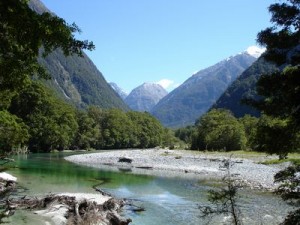Water quality in our rivers, streams, lakes and estuaries is deteriorating as land use, particularly by the agricultural sector intensifies.
 While initiatives like the Dairying and Clean Stream Accord have been introduced in an attempt to clean up our waterways, farm effluent, fertiliser run-off and other contaminants continue to have a major impact on the water we rely on for sustaining aquatic life, drinking water supplies, water-based recreation and cultural values.
While initiatives like the Dairying and Clean Stream Accord have been introduced in an attempt to clean up our waterways, farm effluent, fertiliser run-off and other contaminants continue to have a major impact on the water we rely on for sustaining aquatic life, drinking water supplies, water-based recreation and cultural values.
In this Science Media Centre briefing, water quality experts outlined the major water quality issues facing the country, looked at the latest research coming out of projects monitoring water quality trends and examined potential solutions to the problem of degraded water quality.
Click on the player below to listen back to the briefing. Registered journalists can log into the SMC Resource Library to download the presentations.
PART I
[audio:https://www.sciencemediacentre.co.nz/wp-content/upload/2009/06/water-quality-part-i.mp3]PART II
[audio:https://www.sciencemediacentre.co.nz/wp-content/upload/2009/06/water-quality-part-ii.mp3]
SPEAKERS:
Murray Gibb, CEO Water NZ: Water NZ is a national not for profit technical and educational organisation which promotes the sustainable management and development of the water environment.
Dr Rob Davies-Colley, NIWA Principal scientist, Aquatic pollution: Dr Davies-Colley’s research interests include general water quality, diffuse pollution from pastoral agriculture and other land uses, microbial contaminants and physical aspects of stream and riparian (stream bank) ecology.He is the scientific spokesperson for the National Rivers Water Quality Network (NRWQN), which has been operating for over two decades in 35 major river catchments throughout New Zealand.
Dr Bob Wilcock, NIWA Principal scientist, Chemistry and ecotoxicology: Dr Wilcock is a specialist in land-water interactions and aquatic chemistry and has been working on aspects of environmental sustainability for agriculture for the last 15 years. He has also been monitoring water quality in the Best Catchments Dairying for Sustainable Growth programme for eight years. The programme operates in several major dairying regions throughout New Zealand, from Waikato to Southland and looks at catchment based effects of dairy farming and solutions for improving water quality.
BRIEFING DETAILS:
DATE: June 9
START TIME: 11am (dial in five minutes beforehand)
DURATION: Approx 30 minutes
VENUE: Phone and online
Further Information
To talk to New Zealand experts, please contact the Science Media Centre on tel: 04 499 5476 or email: smc@sciencemediacentre.co.nz.